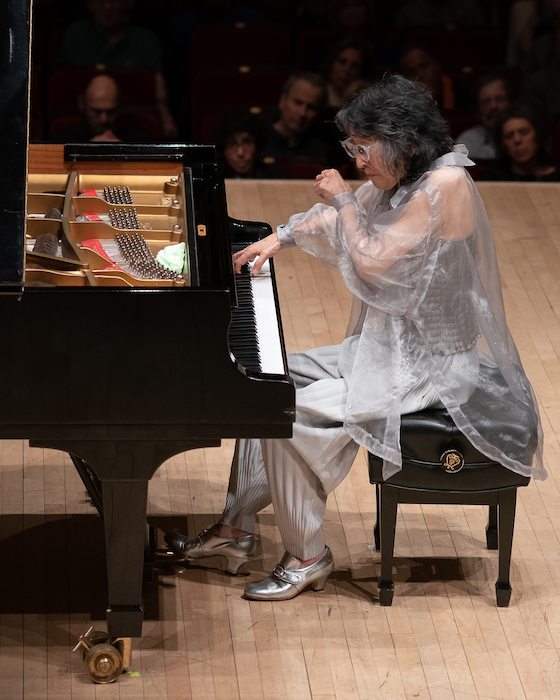Uchida’s final Schubert program fills Carnegie Hall with deep introspection

Mitsuko Uchida performed a program of Schubert sonatas Tuesday night at Carnegie Hall. File photo: Fadi Kheir
Mitsuko Uchida completed her cycle of the Schubert piano sonatas Tuesday night at Carnegie Hall, in a concert rescheduled from April due to illness. That she has played through this cycle before, and recorded all of this music is an obvious indication of how close she is to Schubert’s keyboard repertoire.
The concert was also an indication of how close it is to her. The pairing of pianist and composer goes beyond that of a musician with particular insight into a set of works—it is truly something special.
She played three sonatas: D. 568 in E-flat Major, the A minor Sonata D. 784, and after intermission the A major, D. 959 Sonata. The last two were superlative, while the only thing that kept D. 568 from reaching that level was the marginally lesser quality of the piece compared to the two great later sonatas. The pianist has a quirky habit of putting on her glasses before starting each piece, even though she played from memory.
Uchida’s marvelous touch was on full display—gentle, rounded, and with a crisp spring. Along with Schubert, Uchida is a notable Mozart interpreter, and she brought out a sparkling Mozartian sense of balance and energy in the E-flat sonata.
Phrases were beautiful not only in themselves but in how, rather than treating them as discrete objects, Uchida connected the finish of one into the start of the next. Through her playing, one heard the E-flat sonata as a bridge between the formal, abstracted journey of the classical style and the stream-of-consciousness monologue of romanticism.
Uchida is unique in that her playing is deeply intelligent and thoughtful, while also being so sensitive and transparent that one hears what she’s playing not as something she is doing but as something inherent in the music itself. Other than her presence at the instrument, there is no sense of anyone between Schubert and the listener.
And Tuesday night Schubert had the extraordinary quality of being naive and wise, a glowing and sweet simplicity surrounded by a chiaroscuro of haunted experience.
The D. 784 Sonata comes from a period when the composer knew he was suffering from incurable syphilis, and the D. 959 was finished as death was on the horizon. The music combines guileless loveliness with a brooding darkness and abrupt changes in mood and stream-of-consciousness fantasies.
Uchida is sympathetic to these qualities like no other. In her hands, the drama of the A minor Sonata’s opening movement was dark and earthy in the extreme, and the feeling of the first section repeat was one of contemplating a just-passed wrenching experience.
Her performance of the D. 784 was extraordinary. A rare hush of mass concentration fell over the hall, so deep that when some boor’s piece of technology rang with a grating, electronic sound early in the second movement, it not only demolished that feeling but threw her off. She regained her footing, and with the opposing runs in the final movement she returned an abrading tension to the music.
One was unsure if the D. 959 Sonata could possibly match those heights. It did so by climbing a different summit.
The crisp sharpness of her touch, the quiet intensity, made the open spaces in the music seem vast. She filled these with meaning, or rather channelled Schubert into the void. The second movement Andantino was astonishing—full of regret and despair while being a willful fantasia, improvisatory and spontaneous yet still cohesive and idiomatic in a way one rarely encounters.
At the foundation of the piece is a tricky, complex simplicity; Schubert says exactly what he means with as little as he needs, then says it again, as if talking to himself out loud, then repeating himself with a different tone to see what that might mean. It’s declarative without being rhetorical and so the final movement has phrases that stop without finishing, Schubert interrupting himself, unable to finish a thought. Uchida’s playing was so convincing, so real, that one could hear everything Schubert left unsaid.







Posted Jun 20, 2019 at 11:01 am by Darrell
Unfortunately, we were seated directly behind him when the “boor’s technology (in this case a tablet) rang with a grating, electronic sound early in the second movement.” He was seated in Row A of the Balcony. We were seated directly behind him in Row B.
Posted Jun 20, 2019 at 3:29 pm by Betsy Goldberg
Unable to stay to purchase her CD, with these pieces I am assuming, Can anyone tell me on what CD of hers the A minor, D. 784 and A major, D 959 are recorded?? After that performance I feel I will not be able to bear living without them.
Posted Jun 26, 2019 at 12:20 pm by George Grella
Betsy:
Uchida has recorded all the Schubert sonatas and impromptus, currently in print in a boxed collection on the Philips label. I would recommend this over all other recordings of this music.